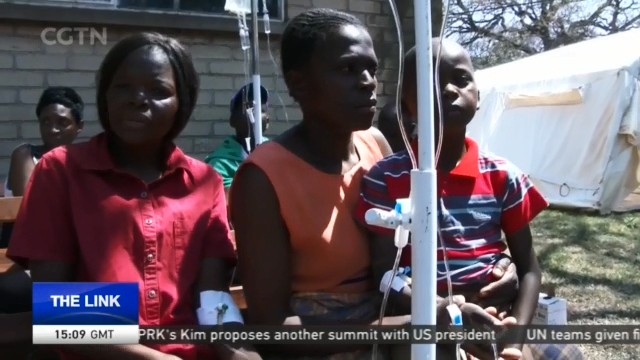
08:09, 13-Sep-2018
Zimbabwe Cholera Outbreak: State of emergency declared in Harare as infections rise
Updated
07:26, 16-Sep-2018
03:18

Healthcare authorities in Zimbabwe have declared a state of emergency in the capital, Harare. At least 20 people have died and another 2-thousand are being treated for the diarrhoeal disease. The outbreak was declared just a week ago, as CGTN's Farai Mwakutuya reports.
In the week since the first case of cholera was reported, the disease has spread rapidly.
Twenty people had succumbed by Tuesday and those needing treatment kept coming in to centres in Harare.
Medical personnel are up against a formidable adversary.
DR OBADIAH MOYO, HEALTH MINISTER, ZIMBABWE "In our particular case, we've got a very difficult one actually because we've isolated three species of germs in simple terms. One called salmonella, one called e-Coli ad the other one, which causes typhoid and the doctors have also realized that there is some resistance to antibiotics except for one particular one. We are declaring an emergency for Harare and this will enable us to contain the cholera typhoid and whatever else is going on. We need to have that opportunity to make sure we get rid of the problem as quickly as possible."
Development partners are bracing for demanding response.
DR MOHAMED AG AYOYA, COUNTRY REPRESENTATIVE, UNICEF ZIMBABWE "We have already mobilized quite significant resources from the UN in General, UNICEF and WHO in particular. We are also talking to our partners on the ground DFID and others to mobilise more resources. We have also alerted our regional offices and headquarters because we have alerted our regional headquarters because we know this is a very serious issue, which will need quite huge investments to contain the outbreak."
Glen View is the epicenter of the outbreak.
Burst sewer pipes, uncollected refuse and erratic water supplies mean squalid living conditions for its residents.
"We have to go to nearby bars to use the toilet because the sewage pipes in our homes don't work properly. We are tired of reporting the faults because the council officers always promise they'll come to attend to them, but never do."
Now that the health time bomb has gone off, council has finally sprung into action.
FARAI MWAKUTUYA, HARARE, ZIMBABWE "New sewer pipes are being laid to replace broken down ones, clean water is being transported here and distributed to residents and there are restrictions on food vending, all part of a response to contain the outbreak."
Health promoters are on a door-to-door campaign to encourage good hygiene.
With so many already infected these foot soldiers hope they aren't too late to win the battle that could save many in their community. FM, CGTN, H, Zimbabwe.

SITEMAP
Copyright © 2018 CGTN. Beijing ICP prepared NO.16065310-3
Copyright © 2018 CGTN. Beijing ICP prepared NO.16065310-3